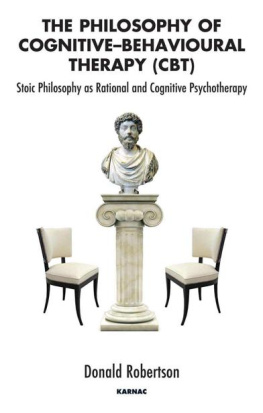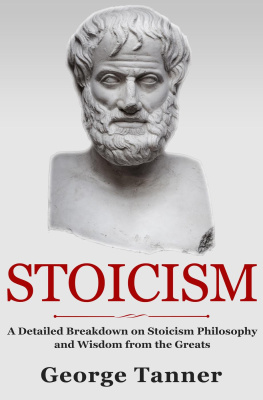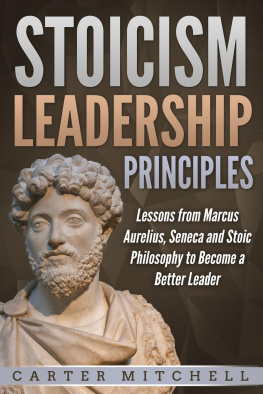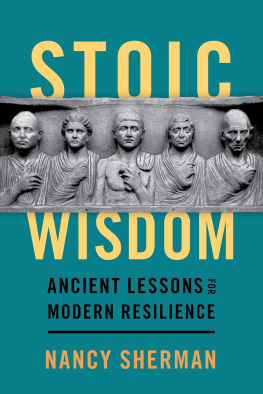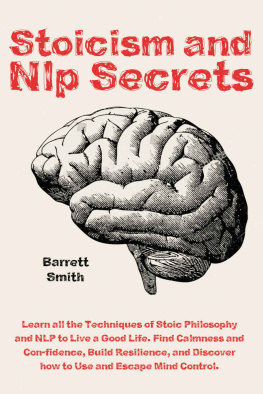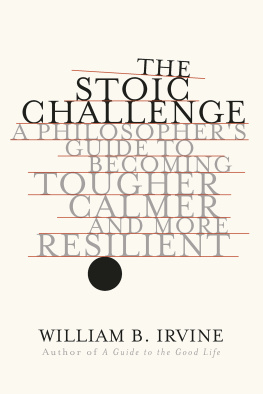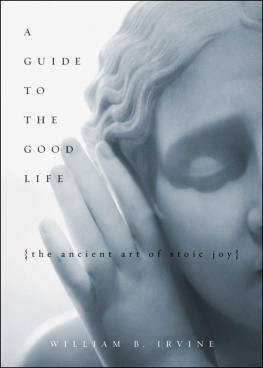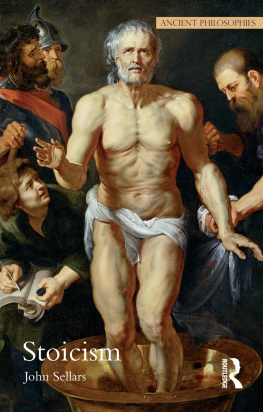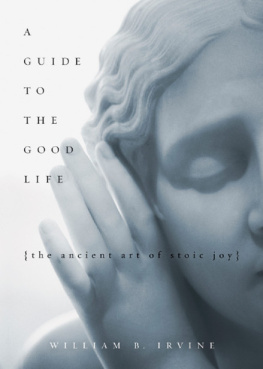Donald Robertson is a cognitive-behavioural psychotherapist who specializes in evidence-based approaches to the treatment of anxiety, and the relationship between ancient philosophy and modern psychotherapy, particularly Stoicism and cognitive-behavioural therapy (CBT). He is the author of five books on philosophy and psychotherapy, including Build your Resilience (Hodder & Stoughton, 2012) in the Teach Yourself series and The Philosophy of Cognitive-Behavioural Therapy: Stoic Philosophy as Rational and Cognitive Psychotherapy (Karnac, 2010). Donald was born in Scotland, and lived in England for many years where he ran a busy Harley Street therapy practice, before emigrating to Nova Scotia in Canada.
Stoicism and the Art of Happiness
Donald Robertson
Acknowledgements
Id like to dedicate this book to my wife, Mandy, and to our beautiful daughter, Poppy Louise Robertson. I love you both.
Id also like to thank everyone involved with Stoic Week and the projects initiated by Professor Christopher Gill and Patrick Ussher at the University of Exeter, for their advice, support, and ideas.
The Metaphor of the Tree
Why, then, do you wonder that good men are shaken in order that they may grow strong? No tree becomes rooted and sturdy unless many a wind assails it. For by its very tossing it tightens its grip and plants its roots more securely; the fragile trees are those that have grown in a sunny valley. It is, therefore, to the advantage even of good men, to the end that they may be unafraid, to live constantly amidst alarms and to bear with patience the happenings which are ills to him only who ill supports them.
Seneca, On Providence
Contents
Note on terminology and citations
Ive chosen to retain conventional translations of certain key terms employed in ancient Stoic literature, while sometimes offering alternative translations. My aim has been to make this book more contemporary in feel and accessible to a modern reader, without compromising too much on meaning. Eudaimonia, Ive translated using the conventional Happiness, although this is problematic and Ive chosen to address that in the book; its also capitalized, therefore, to highlight the special sense of the word.
Referencing, Translations and Further Reading
Ive deliberately omitted many references because the typical format of the Teach Yourself series is geared towards general readability and practical application. Where Ive referenced primary sources Ive often abbreviated the citation by leaving out specific passage numbers, etc. again, for the sake of simplicity and readability. In many cases, Ive quoted or paraphrased ancient sources without including the specific reference.
Throughout this book Ive quoted from many different ancient sources, most of which are available in many different English translations. For the sake of consistency, Ive typically retranslated passages from the original Greek myself, often drawing on several existing translations in doing so. The main English translations Ive quoted from, or consulted, are listed below:
Seneca, Dialogues and Essays (trans. John Davie, 2007). Oxford: Oxford University Press. [Includes selections from On Anger, On Clemency/Mercy, the Consolations to Marcia and Helvia, and On Earthquakes, etc.]
Seneca, Selected Letters (trans. Elaine Fantham, 2010). Oxford: Oxford University Press.
Cicero, On the Good Life (trans. Michael Grant, 2005). Middlesex: Penguin.
Cicero, On Moral Ends (trans. Raphael Woolf, 2001). Cambridge: Cambridge University Press.
Musonius Rufus, Lectures and Sayings (trans. ). Lulu.
Marcus Aurelius, The Meditations (trans. C.R. Haines, 1989). The Loeb Classical Library. Cambridge: Harvard University Press.
Epictetus, The Discourses & Handbook (trans. W.A. Oldfather, 1925). The Loeb Classical Library. Cambridge: Harvard University Press.
Lucan, The Civil War (trans. Susan H. Braund, 1992). Oxford: Oxford University Press.
Diogenes the Cynic, Sayings and Anecdotes (trans. Robin Hard, 2012). Oxford: Oxford University Press.
Cicero, On Moral Ends (De Finibus) (trans. Raphael Woolf, 2001). Cambridge: Cambridge University Press.
Cicero, On the Good Life (trans. Michael Grant, 1971). Middlesex: Penguin. [Includes Tusculan Disputations, On Duties, Laelius: On Friendship, and The Dream of Scipio, etc.]
Diogenes Laertius, Lives of Eminent Philosophers (trans. R.D. Hicks, 1925). The Loeb Classical Library. Cambridge: Harvard University Press.
The two main translations of early Greek Stoic fragments are:
The Hellenistic Philosophers (Vol 1): Translations of the Principal Sources with Philosophical Commentary. (1987). (A.A. Long & D.N. Seldey, Trans.). Cambridge: Cambridge University Press.
The Stoics Reader: Selected Writings and Testimonia. (2008). (B. Inwood, & L. P. Gerson, Trans.) Cambridge: Hackett.
Translations of Cynic fragments, Hermetic, and Pythagorean texts, as well as the writings of Plato, can be found in:
Diogenes the Cynic, Sayings and Anecdotes. (2012). (Robin Hard, Trans.). Oxford: Oxford University Press.
The Way of Hermes: New Translations of The Corpus Hermeticum and The Definitions of Hermes Trismegistus to Asclepius. (1999). (C. Salaman, D. van Oyen, W.D. Wharton, J.P. Mah, Trans.). London: Duckworth.
The Pythagorean Sourcebook. (1988). (K.S. Guthrie, Trans.). MI: Phanes.
Plato: Complete Works. (1997). (J. M. Cooper, ed.). Cambridge: Hackett. [Contains all the works attributed to Plato, translated by a number of different academics.]
Ancient texts are conventionally referenced differently from modern ones. For example, Epictetus Discourses (1.1.25) would mean book one, chapter one, and line number 25 in the original Greek manuscript. For the sake of brevity and readability, Ive generally omitted specific line numbers from these references and just pointed the reader to the more general section of a book in question.
Youll find information on suggested further reading for each chapter at the end of this book, along with a more-detailed bibliography section. Where Ive referred the reader to one of the ancient sources, Id recommend using one of the published translations above. In general, the Loeb Classical Library series contains reliable English translations of Stoic texts from Epictetus, Marcus Aurelius, and Seneca, although a number of other versions of the most-popular works are now available.
Note on gender
The ancient sources are all written by men and assume that the ideal Sage is masculine. They also tend to refer to Stoics in general in the masculine. Ive retained this use of gender in relation to the Sage for the sake of consistency with the source texts but Ive deliberately tried to vary the gender assumed when referring to modern (aspiring) Stoics, for the sake of balance often referring to hypothetical students of Stoicism as she. Zeno, the founder of Stoicism, began his training in philosophy by studying for many years with the famous Cynic philosopher Crates of Thebes whose wife Hipparchia of Maroneia was one of the most notable female philosophers of antiquity. Zeno and his followers apparently considered men and women to be equals and Stoic schools were known for accepting female students, at a time when this was unusual. We have two surviving lectures from the great Roman Stoic Musonius Rufus, in which he argues that girls have a right to benefit from the same philosophical training as boys because they are capable of possessing the same fundamental virtues of character. They are called: That Women Too Should Study Philosophy and Should Daughters Receive the Same Education as Sons?


